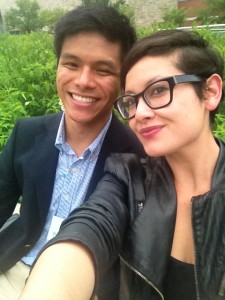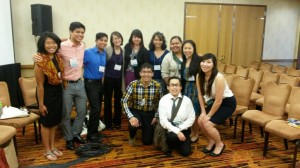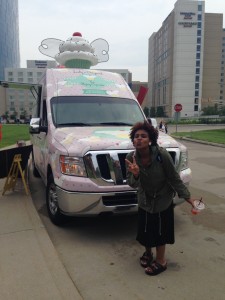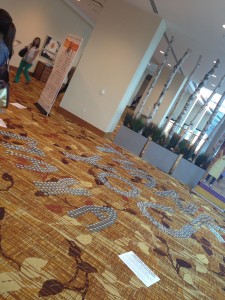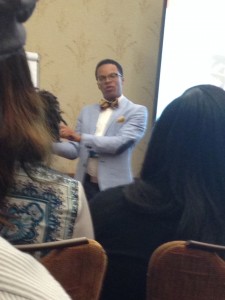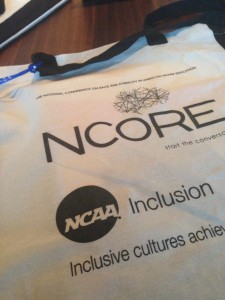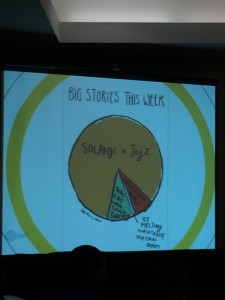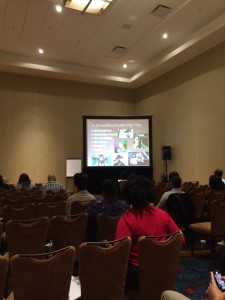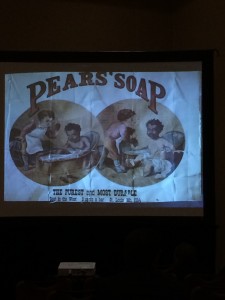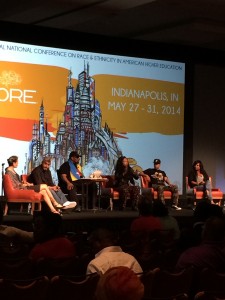I would first like to thank you for allowing me this opportunity to attend the 27th Annual NCORE. Although I was somewhat disappointed to hear the present location of this years conference was at Indianapolis while previous years have been in much more renowned cities, that did not diminish the experience at all. Never have I attended a conference teeming with people of similar but yet different backgrounds striving for the same goal of diversity. It was my honor to be there as a representative for Notre Dame, and next year and in future years, I am sure that others will be able to gain as much as Ihave from NCORE.
Considering this was my first ever NCORE, I was coming in somewhat blind. Although I did try to use the website in order to gain a clearer layout of the conference, I found it nearly impossible to navigate a whole weeks worth of author signings, events, conferences, and caucuses. As someone who likes to plan out events to make the most out of his time, would it be possible for us to be provided the Program and Resource Guide earlier to our arrival? If not, a condensed list of workshops sorted by interest (Asian, Black, Latino, Multiracial or LGBTQ interests) would be appreciated. In addition, a brief highlight on the different caucuses held during the conference would help understand what else NCORE may offer. In understanding the diverse options offered by NCORE, I believe it would give participants a goal in mind. It’s hard to accomplish everything I wanted to in just five days, but once I understood the setup, I was able to divide the workshops I wanted to attend evenly. How I tried to arrange my schedule was to divide the conference into three parts: further reflections of self, understanding of other cultures and mindsets, and to have some fun as well. Other will perhaps have a different agenda in mind coming into NCORE, but I think it would be great to at least give next year attendees a better picture of what to possibly expect at NCORE.
In my attempts to understand self, I decided to attend the Asian American Pre-
Conference for the first part of NCORE. It was here that I was introduced to ProfessorMatthew R. Mock of John F. Kennedy University. I would highly recommend him as a potential Asian/Asian American speaker at Notre Dame. His quirky behavior along with his deep insights of the Asian/Asian American psyche would make him an instant hitwith students. He constantly jokes that he is a “passionate Asian”, and his passion iseasily seen and readily accepted.
The greatest aspects of NCORE are the networking opportunities. Beyond finding potential speakers, this was a great time to meet new people, make new friends, and have deep, meaningful conversations. I would encourage everyone who attends NCORE to purposely seek these types of interactions, as I have found this to be the most enlightening aspect of NCORE for me. You begin to learn things that would not necessarily be taught in a classroom. I met a student who was adopted and learned the struggles she faced as an Asian American adoptee. I heard the amazing story of a woman chased away from her country, and I had a more than 4-hour conversation with a gentleman concerning the crossroads of race and sexuality (he actually sent me his thesis NCORE about this topic). Even though I will probably never encounter these unique individuals again, their stories will have affected the lens in which I view the world. In my opinion, that is exactly the whole purpose of NCORE. I not only had the fortune of meeting faculty, administration, and students from various other colleges, but I also had the fortune of meeting many Notre Dame faculty and administration I have not had the pleasure of meeting yet. I had a great lunch discussion with Dr. Christine Caron Gebhardt concerning the GRC’s role on campus and what can be improved. I also had the great opportunity to talk and connect with Kim Pho about the Asian American experience particularly at Notre Dame. Looking back, I wish I were able to meet the other individuals from Notre Dame prior to going to NCORE. I believe this will help us students put a face to a name for faculty and administration that are fighting the same fight we as students of color are facing.
I have learned a little something with all the different workshops and caucuses Iattended, but probably the most revealing to me was attending the white caucus. It does sound strange for me, an Asian American, to attend a caucus with the purpose of helping people who classify themselves as white to network, but that’s exactly why I went: to get out of my comfort zone and help myself understand the majority experience. It was surprising to say the least to hear what the members of the caucus had to share and their insights on NCORE and their work back on campus. Too many times do we focus on the minority experience that we forget the majority is also affected in this “raced” world. I heard stories of various University’s Diversity Programs and Services, and how they are usually the only white person there. How people of color would look at them with caution wondering, “Why is he/she here?” or “I am not here to absolve your white guilt”. In these stories, I discovered that the same experiences we as minorities face are as real and harmful in the white world as well. My other intention in the white caucus was to hear their views on white privilege and how to navigate this touchy subject. Given the amount of controversy going on at Notre Dame and the particular views held by certain students, I wanted to understand how present the minority’s view of white privilege that could lead to constructive questioning rather than an argument with no real goals accomplished. Much of the advice and insight I did receive was rather disheartening in my opinion, but it has definitely helped. Many of them admitted to rejecting the existence of white privilege in the past before they finally understood what it truly was. In their advice as white people and as someone who struggled with that concept, they told me it ultimately was themselves who had to make that change, but my voice could have some swaying power in their understanding of white privilege.
Just a small recommendation would be to slightly change the business cards given to us to hand out to others. With permission, I think it would be great to have our cell phone numbers included on the business cards. Many times I found myself having to write down my cell phone number to people interested in talking or meeting up later that week. Including any other pertinent information on the business cards would be great as well.
As for suggestions on topics that should be expanded or included in next years NCORE, there should be more discussions on the crossroads of different identities. There were many workshops on being Asian, Asian American, Black, or Latino, but there were few in discussing being Asian and gay, mixed races, or being Latino and appearing white. I understand that the complex nature of diversity sometimes has to be boiled down to a one-dimensional view in order to simplify it, but we cannot neglect the other facets of diversity as well. Other possible topics for discussions are the less known parts of the LGBTQ community: the B and the T. In going to some of the LGBTQ workshops, I noticed how the research or lectures tended to disregard the other groups entirely.
Matt Wong